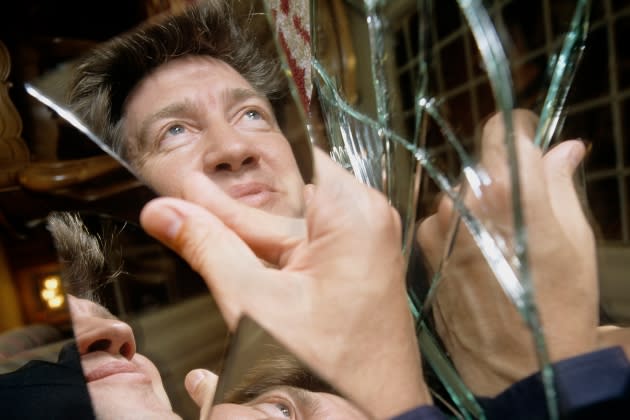The Weird Connection Between David Lynch and ‘The Wizard of Oz’
- Oops!Something went wrong.Please try again later.

David Lynch does not like talking about his movies. He’d prefer the work speak for itself, thank you very much. But in bending over backwards to avoid discussing what something might “mean,” or deflecting questions with humor and/or cryptic pronunciations, the Blue Velvet filmmaker occasionally drops a breadcrumb hint about what makes him creatively tick. An audience member at a Q&A once asked Lynch whether there was a connection between The Wizard of Oz and the movie he’d just screened, Mullholland Drive. His reply: “There’s not a day that goes by that I don’t think about The Wizard of Oz.“
That telling anecdote is recalled in Lynch/Oz, Alexandre O. Philippe’s free-form documentary on the director’s relationship to this Golden Age of Hollywood classic. Kindly note that we use the word “on” as loosely as humanly possible; this essay-ish excavation is less an end unto itself and more a series of means for all sorts of deep-thought inquiries. Like the answer to that above question, the movie both skirts being tied down yet somehow reveals a host of other things — about the man, his movies, the darkness on the edge of Tinseltown, the medium of cinema itself — in the process of dodging and weaving. The destination isn’t important. It’s the winding journey down this endless, semiotic yellow-brick road that counts.
More from Rolling Stone
Divided into six chapters — with voiceover duties divvied up between seven different narrators — this hybrid film doc/portrait of an artist as a superfan takes for granted that America’s greatest weird-as-fuck filmmaker was inspired by the 1939 kids’ flick. You can see it in obvious ways, like the direct Oz homages in Wild at Heart (1990), and in more roundabout ways, like the constant recurring motifs of ruby-red shoes, curtains, and head wounds. (Remember, it’s technically a bump on the noggin that transports Dorothy from sepia-toned Middle America to Munchkinville.) There are a handful of characters named Judy throughout Lynch’s work, and one specifically named Garland in Twin Peaks. Split screens compare eerily similar shots from the holiday-viewing perennial and his filmography. As one of our aural tour guides points out, Lynch would’ve been a kid when Victor Fleming’s take on L. Frank Baum’s book became a regularly re-run fixture on TV in the ’50s. And the entire notion of doppelgangers, not to mention paying attention to what’s happening behind shiny, happy facades, appears to have been introduced into his bloodstream at a very formative age.
There’s a lot of compelling evidence to make the case, in other words, that Dorothy & friends’ Technicolor adventure is a key touchstone to Lynch’s work. But Lynch/Oz doesn’t stop there. Critic (and Rolling Stone contributor) Amy Nicholson traces how Wizard went from flop to family favorite; the “shared candy-colored musical universe” is one of the few places where a divided nation, if not Film Twitter, can come to an ideological consensus. Documentarian Rodney Ascher (Room 237) weaves Back to the Future and The Miracle Worker into the conversation, noting the latter’s surreal black-and-white imagery makes it feel like a Lynch film. Karyn Kusama zeroes in on Mulholland Drive and how it uses Wizard‘s duality to tell a woman’s journey to her best self, albeit this time in reverse. Aaron Moorhead and Justin Benson dig into Judy’s screen persona versus personal tragedies. David Lowery says the movie inspired his films for children. John Waters says it inspired him to take LSD.
Philippe’s docs tend to drill down — 78/52 tells you everything you ever wanted to know about Psycho‘s shower scene but were afraid to ask — or let subjects like William Friedkin (Leap of Faith) and William Shatner (You Can Call Me Bill) go wide, to the point of nearly dissipating into a million tiny pieces. This one almost feels outsourced, as if the seven narrators were handed blank sheets of paper, given the general Lynch-loves-Wizard-of-Oz thesis and told to free-write on whatever angle struck their fancy. It’s a Cubist documentary. The stream-of-conscious, connect-the-dots vibe is nearly overwhelming.
Yet somehow it all works — well, all of it except the WTF bookend of a conspicuously Lynchian announcer acting like Professor Marvel — and fits each disparate piece together to form a complete picture. It’s a little like having coffee with a cluster of caffeinated brainiac film students batting ideas about an artist and the anxieties of influence back and forth. In a perfect world, viewers would get college credit after watching Lynch/Oz. You may not walk away any closer to a degree, unfortunately, but you will definitely land over this rainbow with an entirely different view of a maverick filmmaker’s work, as filtered through Hollywood canon fodder. Who needs explanations when you’ve got explorations like this?
Best of Rolling Stone
